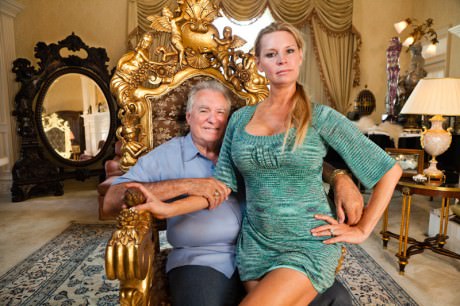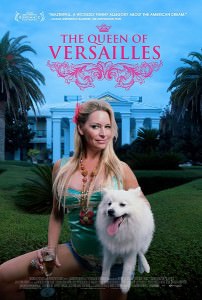The Queen of Versailles illustrates perfectly the roller-coaster-flying-by-the-seat-of-your-pants aspect of documentary filmmaking. The director straps herself in, points the camera and holds on for dear life.

The Queen of Versailles illustrates perfectly the roller-coaster-flying-by-the –seat-of-your-pants aspect of documentary filmmaking. The director straps herself in, points the camera and holds on for dear life.
The subjects of Lauren Greenfield’s film are 73-year-old real estate tycoon, David Siegel, and his third wife, Jackie, a 43-year-old former model and beauty queen. David is a bombastic mogul with an ego that puts Donald Trump’s to shame. He’s all about owning and showing off, and treats his family like pampered chattels, dressing them up and displaying them for all to admire. Jackie is the ultimate self-indulgent trophy wife, never stinting on surgical cosmetic enhancements, lest her husband trade her in for two 20-year-olds (and don’t think he wouldn’t).
When we meet the Siegels in 2007, they’re feeling somewhat cramped in their 26,000 square foot manse in Orlando and are mid-construction on their new house, a 90,000 square foot palace with thirteen bedrooms, thirty bathrooms, three pools, a twenty-car garage, a two-story movie theatre and, of course, an indoor roller rink.
Reality being what it is, there are always unexpected twists and turns before the story’s end. In the case of The Queen of Versailles, the pivotal event is the 2008 subprime mortgage crisis, which leaves Siegel so desperately cash-poor that he’s forced to fire 7,000 employees and shut down a major part of his luxury timeshare operation, Westgate Resorts. The unfinished mansion ends up on the auction block, a grotesque monument to Siegel’s reversal of fortune.
The couple’s financial collapse puts them at a critical crossroad. Will they face the future hand in hand, with love and devotion, for the sake of their seven kids, umpteen dogs and skeletal staff?

Ultimately, your sympathies may lie with the filmmaker, who, quite possibly, embarked on this project intending make a quirky film about a rich couple building their obscenely bloated dream palace. What she ends up with is a family and an empire in ruins.
Since Jackie never actually assumes the role of Queen of Versailles, perhaps a more apt film title would be Ironies in the Fire.
Running time: 100 minutes.
The Queen of Versailles is currently playing at the Landmark Bethesda Row Cinema and AMC Loews Shirlington.




